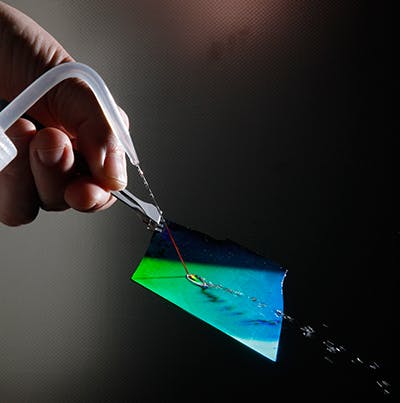(CAMBRIDGE) — The days of algae, mussels and barnacles attaching themselves to boats and other submerged structures may be numbered thanks to SLIPS, a fully-slippery material that solves sticky surface problems. Marine fouling causes many problems: for example, the extra drag that it creates on ship hulls reduces fuel efficiency and adds tens of billions of dollars in extra fuel costs and hundreds of millions of tons of additional CO2 emissions each year. Even more costs are incurred when dry-docking these ships to scrub them clean and to paint their hulls with anti-fouling paints. Almost all of these anti-fouling paints contain copper which is toxic to many marine species and therefore under intense scrutiny by environmental agencies across the world. A few environmentally friendlier foul-release coatings exist but they are very expensive and offer limited effectiveness.

SLIPS™ Technologies, Inc. aims to change all this with its unique, patented slippery materials and coatings. These fully-slippery liquid-infused surfaces are designed to maintain a stable and immobilized thin liquid film on the surface. This liquid over-layer is what makes a SLIPS surface provide a true liquid-to-liquid interface and “feel” extremely slippery to marine fouling agents so they can’t hold on to SLIPS. The company has a range of complementary approaches to make these materials and coatings.
Initial field studies in marine environments show SLIPS to be a potentially effective alternative to the toxic copper-based anti-fouling paints and to the more expensive foul-release coatings. Results from independent studies at Office of Naval Research-sponsored laboratories also confirm that SLIPS surfaces deter adhesion by mussels and barnacles.
The company today announced that a grant from the U.S. Department of Energy’s Advanced Research Projects Agency-Energy’s (ARPA-E) has been received to support a team of researchers from SLIPS and the Wyss Institute at Harvard University who will work together to advance SLIPS materials for marine applications. “We are happy that the government is on the same page with our team to solve challenging energy issues in the marine and shipping communities,” said Daniel Behr, CEO of SLIPS. “Our goal is to identify at least one or two target marine paint applications where SLIPS can start capturing market share, most likely in collaboration with a strategic partner. SLIPS could create a major disruption in the multi-billion dollar marine coatings market.”
The marine coatings market is just one of several being targeted by SLIPS Technologies. The company is working with dozens of customers who want to use its patented fully-slippery materials to solve sticky problems in industrial, medical, and consumer applications – for example, to prevent bio fouling on medical devices, to reduce the stickiness of viscous liquids on surfaces and containers, and to improve the efficiency of heat exchangers.